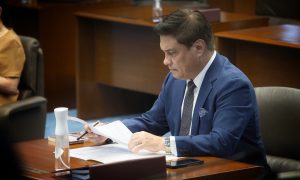The Philippine Senate has a new leadership after Senate President Juan Miguel Zubiri quit his post to give way to new Senate President Francis Escudero. Reports alleged that Zubiri lost his position after he opposed the proposal to amend the 1987 Constitution through a People’s Initiative backed by members of the House of Representatives headed by Speaker Martin Romualdez, who is a first cousin of President Ferdinand “Bongbong” Marcos Jr. Zubiri also reportedly lost the support of Marcos allies after he allowed a Senate probe on a leaked document naming the president as among the suspected drug users being monitored by government agencies
Zubiri gave credence to these speculations during his final speech as leader of the Senate. “I have never dictated my position to any of you, and I always supported your independence – which is probably why I face my demise today. I failed to follow instructions from the powers that be,” he said.
“I fought the good fight. If I have ruffled some feathers in doing so, if I have upset the powers that be, then so be it.”
Zubiri was confident of having the support of the majority two days before he was forced to step down as Senate President. His ally, Senator JV Ejercito, cited an “external force” who supported the Senate coup. “We can just surmise, I don’t want to speculate or name anybody but I would think it will be somebody higher than the Senate to influence the minds and the positions of the senators for them to have a change of heart,” Ejercito told the media.
Both Zubiri and Ejercito did not specify the powerful forces who influenced the vote of senators but they could only be referring to the office of the president, an institution that has traditionally used its vast resources to coopt the Senate. It is revealing that a day after the Senate coup, the president and the first lady hosted a dinner for members of the Senate and their spouses, which could mean that the change in the leadership was welcomed by Malacañang (the presidential palace).
Former Senator Leila de Lima, who spent almost seven years in detention for being a fierce critic of former President Rodrigo Duterte, saw the hand of the president’s office in the Senate leadership reshuffle. “Malacañang getting its way every time with the Senate is not a good thing as it goes against the very principles of checks and balance and separation of powers,” she wrote on her X (Twitter) account.
Related to this, the Philippine Star editorial reminded senators “that their loyalty is not to whoever is in power, but to the nation and the Filipino people.”
Meanwhile, veteran journalist Ana Marie Pamintuan lamented the state of the political party system in the country. She wrote: “It’s bad enough that our political party system is a farce, with no group standing for any particular ideology or position on controversial issues. Party switching or butterfly politics is the rule rather than the exception, with politicians flitting from one party to the other, whichever is in power.”
Indeed, reports did not mention the party affiliations of Zubiri, Escudero, and their respective allies in the Senate since the support of political dynasties has played a bigger role than party dynamics in Philippine politics. Also, those who didn’t vote for the new Senate President are not assumed to be switching to the minority or opposition, which reveals the absence of a strong critical bloc in the legislature.
The new Senate leadership faces several challenges ahead of the 2025 midterm elections but its biggest test is to prove its independence from Malacañang. It has yet to make a clearer position on the issue of amending the Constitution. It should use the session break until July to consult with various stakeholders and come up with a new agenda focused on addressing the people’s urgent concerns and demands such as higher wages, stable jobs, better livelihoods, and faster delivery of adequate social services.

































